battle of the bulge
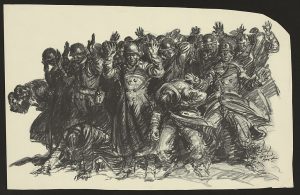 The many atrocities of the Nazi soldiers are well known, but somehow, every time I read about another one, I am very shocked again. I suppose that the prisoners of war were treated better than the Jews or the political prisoners, but I don’t think it was enough better to really take notice of. The Third Reich was an equal opportunity murder machine. Somehow they felt certain that they could get away with anything they wanted to do.
The many atrocities of the Nazi soldiers are well known, but somehow, every time I read about another one, I am very shocked again. I suppose that the prisoners of war were treated better than the Jews or the political prisoners, but I don’t think it was enough better to really take notice of. The Third Reich was an equal opportunity murder machine. Somehow they felt certain that they could get away with anything they wanted to do.
During the Battle of the Bulge, which was a major German offensive campaign on the Western Front during World War II. It took place from December 16, 1944 to January 25, 1945. The battle was launched through the densely forested Ardennes region of Wallonia in eastern Belgium, northeast France, and Luxembourg, towards the end of the war in Europe. The war was winding down, and the Germans knew they were losing. It was during this time that they began trying to get rid of the evidence.
The Malmedy massacre was the result of their attempt to hide what they were doing. I was a war crime committed by members of Kampfgruppe Peiper, which is a part of the SS Division Leibstandarte, a German Waffen-SS unit led by Joachim Peiper, at Baugnez crossroads near Malmedy, Belgium, on December 17, 1944. 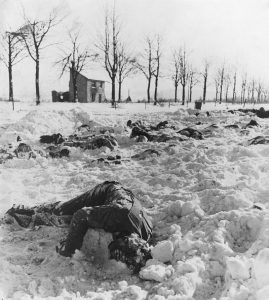 In all, 84 American prisoners of war were massacred by their German captors. The Germans assembled the prisoners in a field and mowed them down with machine guns. Afterward, they walked through the field and any of the prisoners who were still alive were killed by close-range shots to the head.
In all, 84 American prisoners of war were massacred by their German captors. The Germans assembled the prisoners in a field and mowed them down with machine guns. Afterward, they walked through the field and any of the prisoners who were still alive were killed by close-range shots to the head.
The term Malmedy massacre has also been generally associated with the series of massacres committed by the same unit on the same day and following days. These men were intent on getting rid of the evidence of their crimes. With these men living, they could tell the world how they had been treated. They felt that the if the men were dead, then Germany could get out of the war crimes. Nevertheless, they killed these men in vain, because the killings were the subject of the Malmedy massacre trial, which was part of the Dachau Trials of 1946.
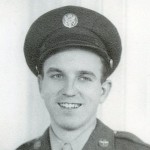
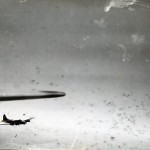 As I have researched the infantry soldiers of World War II, my thought was that I was really thankful that my dad, Allen Spencer was not one of those men on the ground during the fighting. I felt bad for those men who were on the ground, fighting from the foxholes. I still do, because they were in constant danger. Bombs fall from the sky, and bullets fly from across the battlefield. If those things didn’t kill a soldier, the freezing cold, trench foot, or dysentery from the horribly unsanitary conditions could. It seemed that my dad’s situation was by far safer, but now, I’m not so sure that’s true.
As I have researched the infantry soldiers of World War II, my thought was that I was really thankful that my dad, Allen Spencer was not one of those men on the ground during the fighting. I felt bad for those men who were on the ground, fighting from the foxholes. I still do, because they were in constant danger. Bombs fall from the sky, and bullets fly from across the battlefield. If those things didn’t kill a soldier, the freezing cold, trench foot, or dysentery from the horribly unsanitary conditions could. It seemed that my dad’s situation was by far safer, but now, I’m not so sure that’s true.
The book I had been listening to, that took in World War II from D-Day to The Battle of the Bulge, talked mostly about the ground war, but then at the end, the reader said something that really struck me. It was about the look that crossed the face of a bomber crew’s faces before certain missions…those that would inevitably find the plane flying through flak. The look was one of fear. I knew flak was dangerous, but somehow I didn’t really connect flak with bringing down a plane, or seriously injuring its occupants. Nevertheless, it is quite dangerous for them.
As I researched the dangers of flak, a shocking revelation made itself known. I had written a story about the life expectancy of the ball turret gunner. My findings were that that life expectancy was about 12 seconds. That may be true when one is talking about the prospect of being shot, but when it comes to flak, that cannot be said. Apparently, where flak is concerned, the best place to be is in the plexiglass structure of the ball turret. Plexiglass holds up better against flak than other areas of the plane, so the ball turret gunner is much more protected…at least from flak. The same cannot be said for the bullets flying through the area. I was thankful that my dad was not a ball turret gunner, and that he only filled in as a waist gunner periodically. The waist gunners were in the open, where protection from bullets, and from flak was minimal…at best, non-existent at worst. I can’t imagine how those memories must have affected my dad, but in the book I listened to, the main reason many of the men didn’t want to talk about their experiences in World War II, or any war, was because talking about it brought those memories flooding in again.
After researching flak, and how it works, I can see why the men would get a look of fear on their faces as they prepared to go through areas anti-aircraft weapons shooting flak into the air. Some men said that they could see the red hot glow in the center of the flak, if it was very close. That tells me that it was like a small explosive devise. No wonder it could bring so much damage to a plane. I had known that flak could put holes in the fuselage, but somehow I hadn’t tied that with bringing down a plane. I surmise that it was the B-17 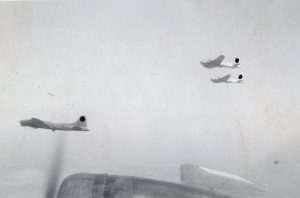
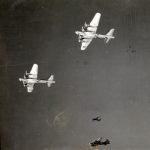 bomber top turret gunner’s daughter in me that wouldn’t allow me to place that danger around my dad. I didn’t want to think about the dangers of his every mission in World War II. My mind seems to have placed his plane in a bubble or a force field, so that no danger could come near him. I think every veteran wonders why they were spared, when others didn’t make it back home. I don’t think anyone can answer that question. As a Christian, I have to credit God for bringing my future dad home.
bomber top turret gunner’s daughter in me that wouldn’t allow me to place that danger around my dad. I didn’t want to think about the dangers of his every mission in World War II. My mind seems to have placed his plane in a bubble or a force field, so that no danger could come near him. I think every veteran wonders why they were spared, when others didn’t make it back home. I don’t think anyone can answer that question. As a Christian, I have to credit God for bringing my future dad home.
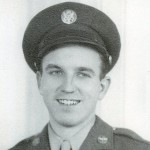
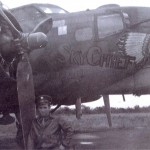 After World War II, many of the veterans were hesitant to talk about their experiences. My dad, Allen Spencer was one of those men. We were never exactly sure why he didn’t talk about it, but thought that he didn’t want to brag. I don’t really think that was it at all.
After World War II, many of the veterans were hesitant to talk about their experiences. My dad, Allen Spencer was one of those men. We were never exactly sure why he didn’t talk about it, but thought that he didn’t want to brag. I don’t really think that was it at all.
While listening to an audiobook called Citizen Soldiers, which covers the D-Day battle and the Battle of the Bulge, it hit me…even before the author said it. The reason soldiers didn’t talk much about war was a deliberate effort to forget. Unfortunately for most of her them, forgetting was impossible. Their minds were filled with haunted memories. The book mostly covers the thoughts of the infantry, but touches on the air war too.
After listening to the author’s account of the battle, I don’t think I could ever forget either, and I wasn’t there. Memories of the 19 year old farm boy away from home for the first time, and not really trained for combat. When the shooting started, he stood up to fire. Other soldiers told him to get down, by it was too late. His first battle had become his last, as an enemy bullet pierced his forehead. The soldiers who witnessed it, felt sick to 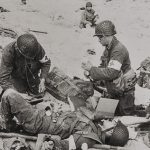
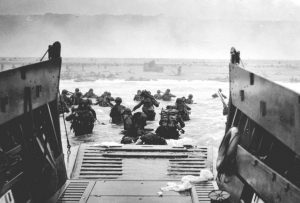 their stomachs. It was a time when a seasoned veteran was just 22 years old…and he had been made an office when his commanding officer was killed. There weren’t very many of the older men left…and by older I mean 30.
their stomachs. It was a time when a seasoned veteran was just 22 years old…and he had been made an office when his commanding officer was killed. There weren’t very many of the older men left…and by older I mean 30.
There were memories of a young prisoner of war, packed into a train to the POW camps was singing in his beautiful tenor voice, all the Christmas music he could think of to help raise moral. It was working, but suddenly the trains were under attack. The prisoners couldn’t get out, and the guards had run away. Finally a skinny boy was able to get out through a tiny window. He opened the door to his car and the men moved to free the other prisoners. There was really nowhere to go, but they escaped the attack. Then, the guards came back and loaded them back on the train. When someone asked the tenor to sing some more, they were told that he hadn’t made it back. His sweet voice was forever silenced. The men on the train were silent too…sick at heart.
The fighters in the plane’s overhead knew that it was kill or be killed, but whenever a plane went down, enemy 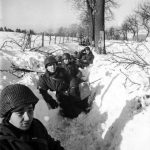
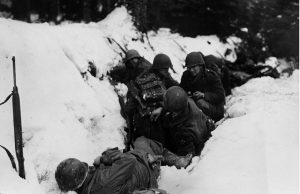 or one of theirs, they counted the parachutes, hoping the men got out alive. For them non the planes dropping bombs, they knew that someone below went to work that day, having no idea tat they would not be returning home again. They had been simple factory workers, just doing what they were told. And what of the missed targets that landed bombs on schools and other civilian locations. The men in the planes above had to live with that. They had done their duty, but it certainly didn’t feel good.
or one of theirs, they counted the parachutes, hoping the men got out alive. For them non the planes dropping bombs, they knew that someone below went to work that day, having no idea tat they would not be returning home again. They had been simple factory workers, just doing what they were told. And what of the missed targets that landed bombs on schools and other civilian locations. The men in the planes above had to live with that. They had done their duty, but it certainly didn’t feel good.

